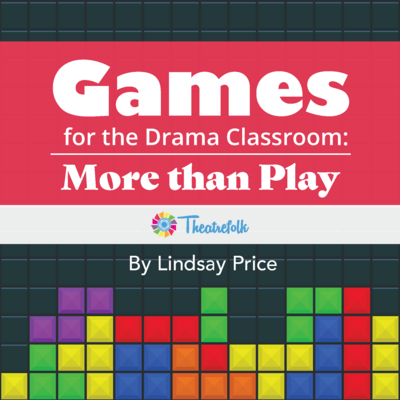There exists in everyone the potential for good or evil. Laramie Dean's adaptation of Dracula asks the question: How much would it take to bring out the darkness inside of you?
Theatre Game: Dramatic Rules
This classroom exercise is a mash-up of two of my most favourite theatre games: Scenes from a Bag and Act It Out. This game works as a warm-up activity. It’s great for getting students to explore different ways of moving their bodies. They have to think quickly, imaginatively, and outside the box. This game could even be the inspiration for a new theatrical creation! Who knows?
What You’ll Need:
- Whiteboard and pen, or computer – for brainstorming
- Plain paper
- A written list of all the students’ names
- Scissors
- Three paper bags (or hats)
How to Play:
Step 1: Brainstorm the WHAT and the HOW
First, have students brainstorm a list of topics that involve rules, lessons, or “how tos.” This is WHAT your students will be performing. Anything goes! Here are some ideas to get you started:
- Theatre etiquette rules or audience etiquette rules
- Table manners
- Rules of the road (walking, cycling, driving)
- Rules for a sport (baseball, hockey, curling, gymnastics…)
- How to behave in a public place (school, grocery store, shopping mall, at a wedding)
- “Netiquette” or social media rules and guidelines
Second, brainstorm a list of different theatrical performance styles that you have studied in drama class (or would like to explore more!). This is HOW your students will perform their pieces. Here are some examples:
- Comedy
- Tragedy
- Absurdist
- Radio play/radio drama
- Musical theatre
- Pantomime
- Mime
- Tableau
- Puppetry
- Improvisation
- Technical theatre (sounds/lights/tech only)
- Dance/movement piece
- Newscast
- Documentary
- Infomercial
- Theatre for young audiences/children’s theatre
- Mask
- Clown
Step 2: Prep the Game Elements
Transcribe both lists onto paper and cut each item onto its own slip of paper. Put all the WHAT slips into one bag, and all the HOW slips into a second bag.
Lastly, take the list of names of your class and cut that into slips as well – those slips go into the third bag, the WHO bag. (It’s almost like a theatrical version of the game Clue!)
Step 3: Roll up and Choose Your Fate!
Depending on the number of students, draw three to four names out of the WHO bag to make up small groups. Draw one WHAT slip – this is the topic that each group will focus on for their scene. Each group in turn will then draw a HOW slip. From there, they will have five minutes to create a brief scene (one-two minutes) on the overall WHAT topic drawn by the teacher, in the HOW genre they selected.
For example:
- Theatre etiquette rules taught in a comedic style
- How to behave at a wedding through mime
- Teaching the rules of baseball in a children’s theatre style
- Tragic table manners
Enforce the five-minute preparation rule – this game is not meant to be for creating a brilliant, polished performance. It’s meant to challenge students to work quickly, come up with an idea (any idea!), and go with it.
Have students quickly narrow down their topic to one rule. For example, if students have the prompt “table manners,” they could narrow their scene down to using their napkin properly, not talking while eating, the proper way to set a table, or how to use the correct cutlery. Once they’ve decided on their narrowed focus, students will prepare a brief scene (one-two minutes) in the style they’ve chosen.
Alternative: This game can easily be reversed, with the whole class preparing different rule/how-to scenes in the same way (for example, each different lesson is taught through musical theatre).
Bonus Idea: If students truly don’t know an actual rule to share (let’s say one group was given “how to behave at a wedding” and the group members have never attended a wedding before), have them make up their best guess at what a rule might be!
Step 4: Share Your Lesson, Rinse and Repeat
After five minutes have passed, each small group will present their brief scene to the class. Once each group has presented their scene, repeat the process two more times, selecting a new WHAT topic for the full class and HOW slip for each small group both times.
Step 5: Discussion and/or Reflection
Don't miss the link at the end of this article for a free reflection each student can submit (which can also be used for a class discussion as well).
Extension: Use this exercise as a jumping-off point for devising a series of scenes or one-act plays used to teach an idea, a concept, or a set of rules. Who might benefit from such a production? In what style would this creation be most effective? How could you make the ideas appealing to an audience? How can students combine the educational with the entertaining?
Distance Learning Adaptation 1: Virtual Classroom Etiquette
You can use this exercise to help students learn and practice virtual classroom rules. Brainstorm with your students what rules and etiquette they think are important for the digital classroom. Some ideas might include:
- Arrive on time for virtual class
- Keep your microphone muted when you aren’t speaking
- Keep your video screens on
- Keep the written chat area for class-related chat only
Divide students into pairs. Assign each pair a rule and a theatrical performance style (comedy, mime, musical theatre, newscast, documentary, infomercial, etc.) and have them improvise a brief scene either demonstrating the benefits of the rule, or the consequences of breaking the rule. Alternatively, send them into a separate online breakout room to have five minutes to discuss and prepare a quick scene, then bring everyone back together to present their works-in-progress.
How can students make their scenes entertaining and informative at the same time?
Distance Learning Adaptation 2: Prepared Video
This adaptation will take longer to do and will involve some homework for your students.
Assign students the WHO, WHAT, and HOW portions of the assignment. You can select each element for the groups, or if you wish to keep things random, write each element on slips of paper and draw slips out of a bag or a hat yourself. You could also use a random generator such as Wheel Decide to assign elements to your students.
Have groups work together to write a brief scene (1 minute or less) demonstrating the rule using the assigned theatrical performance style, rehearse it, film it, and edit it together using software such as Windows Movie Maker or iMovie.
Alternatively, if your students do not have access to video editing software or do not know how to use it, they can film their footage and then send it to you, along with their scripts, to edit together. You may also wish for your students to prepare a storyboard illustrating how they want their footage to be edited.
Once the scenes have been edited, present them to the rest of the class to watch as a group.
Related Articles
Create Your Own Choice Board: Drama Activities
by Lindsay Price
Choice boards give students the opportunity to choose how they want to learn a particular subject. Create Your Own Choice Boards: Drama Activities can help encourage your students' independence by allowing them to take an active role in their learning.
Distance Learning
by Christian Kiley
A play about trying to survive and thrive in a virtual classroom.
Games for the Drama Classroom: More Than Play
by Lindsay Price
A collection of games and activities that go well beyond the notion of "play."
Improv Games with Purpose
by Jennine Profeta
Improv games including feedback suggestions and questions, game variations, teaching tips, side coaching tips, entry prompts, exit slip questions, and more!







